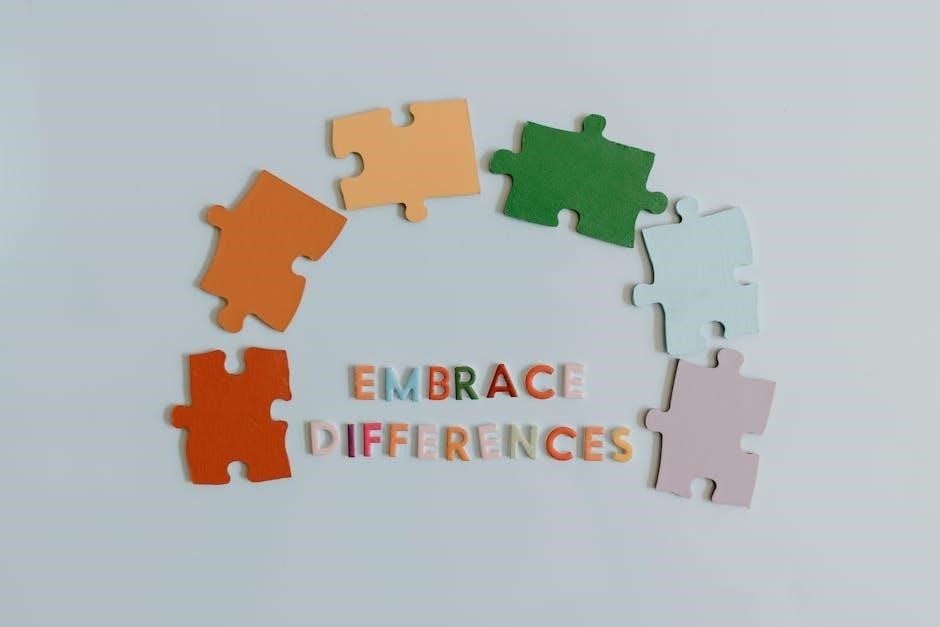Brenda J. Allen’s book, inspired by Cornel West’s Race Matters, extends the discussion to six social identity categories, exploring how communication shapes identity and the sociohistorical contexts influencing interactions.
Overview of the Book’s Central Theme

Brenda J. Allen’s Difference Matters delves into the significance of social identity categories, including gender, race, social class, ability, sexuality, and age, emphasizing how these differences shape interactions and societal dynamics. The book highlights the importance of communication in constructing and negotiating identities, illustrating how historical and cultural contexts influence perceptions. Allen builds on Cornel West’s premise that race matters by expanding the discussion to include additional identity categories. She provides a comprehensive analysis of sociohistorical developments, demonstrating their profound impact on how individuals and groups are perceived and treated. By examining power dynamics and discourse, Allen underscores the transformative potential of communication in fostering understanding and inclusivity. Her work serves as a vital resource for navigating diverse social landscapes, promoting ethical engagement with identity-related issues.
Importance of Social Identity in Communication

Brenda J. Allen underscores the critical role of social identity in shaping communication, asserting that differences in gender, race, social class, ability, sexuality, and age profoundly influence interactions. Social identity serves as a lens through which individuals perceive themselves and others, often unconsciously guiding behavior and discourse. Allen argues that communication not only reflects but also constitutes social identity, making it a powerful tool for both constructing and negotiating these categories. By examining historical and cultural contexts, she illustrates how perceptions of identity evolve over time, impacting interpersonal and intergroup dynamics. The book emphasizes that understanding and addressing these identities is essential for fostering inclusive communication, mitigating conflict, and promoting mutual respect. Allen’s approach highlights the interplay between power dynamics and identity, offering insights into how communication can bridge divides or reinforce them, depending on how differences are acknowledged and addressed.
Historical Context and Sociohistorical Developments
Brenda J. Allen’s Difference Matters provides a comprehensive analysis of the sociohistorical developments that have shaped perceptions of social identity in the United States. She examines how categories such as gender, race, social class, ability, sexuality, and age have evolved over time, influenced by cultural, political, and economic shifts. Allen highlights key historical events, such as the Civil Rights Movement and the women’s suffrage movement, to illustrate how societal norms and power structures have impacted identity formation. By tracing these developments, she reveals how communication practices have both reflected and reinforced social hierarchies. For instance, she discusses how language and discourse have historically marginalized certain groups, perpetuating inequality. Allen’s historical framework underscores the importance of understanding the past to address contemporary issues of identity and communication effectively. This analysis provides a foundation for fostering inclusivity and challenging systemic biases in modern interactions.

Key Concepts Explored in the Book
Brenda J. Allen explores six social identity categories—gender, race, social class, ability, sexuality, and age—examining power dynamics and how communication shapes and negotiates these identities.
Social Identity Categories: Gender, Race, Social Class, Ability, Sexuality, and Age

Brenda J. Allen examines six key social identity categories: gender, race, social class, ability, sexuality, and age. These categories shape how individuals perceive themselves and others, influencing interactions and societal structures. Allen emphasizes that these identities are not isolated but intersect, creating unique experiences of privilege and marginalization. For instance, gender and race often overlap, leading to compounded discrimination. The book explores how historical contexts, such as shifting perceptions of gender roles or racial hierarchies, have influenced these identities over time. Allen also highlights how communication reflects and reinforces these categories, often unconsciously. By analyzing these social identity categories, the book provides a framework for understanding how differences impact relationships and societal dynamics. This exploration is central to fostering inclusivity and addressing systemic inequities rooted in identity-based biases.

The Role of Power Dynamics in Shaping Social Identity

Brenda J. Allen underscores how power dynamics significantly influence social identity, shaping perceptions and interactions. Power imbalances often lead to marginalization, with dominant groups defining norms and standards. Allen illustrates how historical contexts, such as systemic racism or patriarchal structures, have entrenched power disparities. These dynamics affect how individuals and groups view themselves and others, reinforcing social hierarchies. Communication plays a crucial role in perpetuating or challenging these power structures. Allen argues that recognizing and addressing these power dynamics is essential for fostering equity and inclusivity. By examining how power operates within social identity categories, the book provides insights into dismantling oppressive systems and promoting social justice. This analysis is vital for understanding how power shapes identity and informs strategies for creating a more equitable society.
Communication as a Tool for Constituting and Negotiating Social Identity
Brenda J. Allen highlights communication as a powerful tool for shaping and negotiating social identity. She emphasizes that communication is not merely the exchange of information but a process that constructs and reinforces social identities. Through verbal and non-verbal cues, individuals signal their group memberships and negotiate their positions within social hierarchies. Allen illustrates how language, tone, and discourse patterns reflect and create identities, often unconsciously. For instance, the use of specific jargon or pronouns can signal belonging to particular groups. Communication also serves as a means to challenge or reinforce power dynamics, influencing how identities are perceived and treated. By examining these processes, Allen provides insights into how communication can foster inclusivity or perpetuate exclusion. Her work underscores the importance of mindful communication in navigating and transforming social identities, ultimately promoting understanding and respect across differences.

Practical Implications and Applications
Brenda J. Allen’s work offers practical strategies for fostering inclusive communication and addressing discrimination, emphasizing the importance of understanding and respecting social identity differences in various contexts, from education to workplace interactions.
Strategies for Effective Communication Across Differences
Brenda J. Allen emphasizes the importance of active listening, empathy, and self-awareness in bridging gaps between diverse social identities. She advocates for recognizing and respecting differences in gender, race, social class, ability, sexuality, and age. Allen suggests fostering open dialogue by creating safe spaces for expression, encouraging non-judgmental interactions, and addressing power imbalances. She also highlights the need for cultural competence and adaptability in communication styles. By understanding the historical and social contexts that shape identities, individuals can better navigate differences. Allen’s strategies are applicable in various settings, from education to the workplace, promoting inclusivity and collaboration. Effective communication across differences not only enhances personal relationships but also contributes to societal progress by fostering respect and equity.
Addressing Discrimination and Promoting Inclusivity
Brenda J. Allen underscores the necessity of addressing discrimination by acknowledging the historical and systemic roots of inequality. She advocates for promoting inclusivity through education, empathy, and the active dismantling of biases. Allen emphasizes the importance of creating environments where diverse voices are heard and valued, encouraging individuals to challenge their own assumptions and privileges. By fostering a deeper understanding of how social identities intersect, Allen’s work provides a framework for recognizing and confronting discrimination in all its forms. She also highlights the role of ethical communication in promoting inclusivity, stressing the need for respect, confidentiality, and non-discrimination. These principles align with broader ethical standards, such as those outlined in the NASW Code of Ethics. Ultimately, Allen’s approach empowers individuals and organizations to create more equitable and inclusive spaces, fostering a society where differences are celebrated rather than marginalized.

Ethical Considerations in Managing Social Identity

Brenda J. Allen emphasizes the ethical dimensions of managing social identity, highlighting the importance of respect, confidentiality, and non-discrimination. She aligns her approach with ethical frameworks, such as the NASW Code of Ethics, to guide equitable interactions. Allen advocates for self-reflection and accountability, urging individuals to examine their biases and privileges. By promoting ethical communication, she encourages the creation of inclusive environments where diverse identities are valued. Allen’s work underscores the need for ethical awareness in navigating power dynamics and social hierarchies, ensuring that differences are not used to marginalize but to enrich collective experiences. Her insights provide a moral compass for fostering empathy and justice in both personal and professional settings, ultimately contributing to a more inclusive and ethical society.
